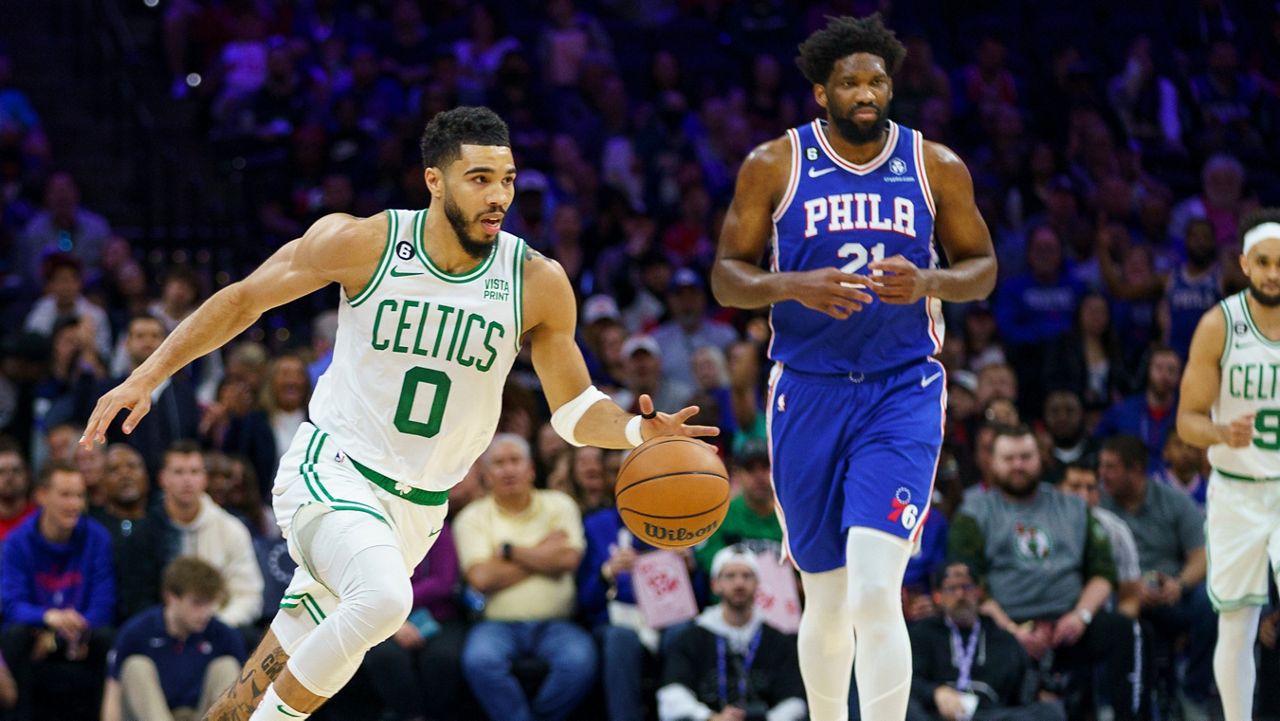Sports
What to know entering the NBA playoffs, which start Saturday – Spectrum News NY1

Get the best experience and stay connected to your community with our Spectrum News app. Learn More
Continue in Browser
Get hyperlocal forecasts, radar and weather alerts.
Please enter a valid zipcode.
Save
Here’s a rarity: All five teams from one division are going to the NBA playoffs.
And they pulled that off in a year where a division champion almost didn’t get there.
All five teams from the Pacific Division — Sacramento, Phoenix, the Los Angeles Clippers, Golden State and the Los Angeles Lakers — have made the playoffs, which start Saturday.
But Miami, the champion of the Southeast Division, almost missed out. The Heat got there Friday night by closing on a 15-1 run to beat Chicago 102-91 in the final Eastern Conference play-in game.
Had the Heat lost, it would have been the first time in NBA history that a division winner wasn’t going to the playoffs.
On the other end of the spectrum, the whole-division-goes feat had happened only two other times since the NBA went to the six-division, five-teams-in-each format starting with the 2004-05 season.
The Central Division did it in 2006, and the Southwest Division pulled it off in 2015. It almost happened in the Northwest Division in 2018 when Denver missed the playoffs by a game. And the Atlantic Division had a chance to send all its teams this year if Toronto gotten out of the play-in tournament.
PLAY IN TO PLAY ON
The play-in tournament provided a path for Miami, Minnesota, the Los Angeles Lakers and Atlanta to make the playoffs.
And now, they’ll try to go from playing in to playing on.
No team has managed that yet.
Granted, there’s only been three previous versions of a play-in tournament, but no team has gone from the extra round in between the regular season and playoffs and gotten an actual postseason series win.
In 2020, Portland (which beat Memphis in a one-game play-in round inside the restart bubble) lost 4-1 to the top-seeded Lakers.
In 2021, the Lakers (4-2 to Phoenix), Memphis (4-1 to Utah), Boston (4-1 to Brooklyn) and Washington (4-1 to Philadelphia) were all ousted in Round 1.
And last year, Minnesota (4-2 to Memphis), New Orleans (4-2 to Phoenix), Atlanta (4-1 to Miami) and Brooklyn (4-0 to Boston) also lost their opening series after qualifying through the play-in.
2 TO 1
Golden State did something unusual last season. It finished second in the Pacific Division — and first in the NBA.
That’s a serious break from the norm.
From 2012 through 2021, every team to make the NBA Finals did so after winning a division championship. The 2011 Dallas Mavericks had been the most recent team not to win its division but make the finals; they won the title that season.
The Warriors did it last season, also winning the title.
This season’s division champions: Boston, Milwaukee, Miami, Denver, Sacramento and Memphis. History suggests that two of those six teams would be the wise picks for those forecasting who’ll make the finals.
SEASON OF COMEBACKS
Playoffs might not have looked likely for a bunch of teams in the early going of the season.
Philadelphia started 0-3, Sacramento started 0-4, Brooklyn was 1-5, Golden State was 3-7, the Los Angeles Clippers opened 2-4, Minnesota was 5-8, Miami was 7-11 — and the Los Angeles Lakers were 2-10, a level of bad start that few teams have been able to overcome.
The Lakers are just the 15th team in NBA history to start 0-5 and make the postseason. And only four teams were worse than 2-10 after 12 games and still made the playoffs. Last season’s New Orleans Pelicans started 1-11 and got there, as did the 1967-68 Chicago Bulls and 1984-85 Cleveland Cavaliers.
But the undisputed bad-start-and-made-playoffs-anyway kings are the 1996-97 Phoenix Suns. They started 0-13, wound up finishing 40-42, held a 2-1 series lead over top-seeded Seattle in the best-of-five opening round, then fell in five games.
WINS MILESTONE
Golden State teammates Klay Thompson and Draymond Green have both appeared in 102 playoff victories.
That’s tied for 25th-best all-time, and they could keep climbing the charts this spring.
They’re currently two wins behind Danny Green; three behind Dwyane Wade and Dennis Johnson; five behind Bill Russell, Robert Parish and Warriors teammate Andre Iguodala; and six behind No. 18 John Havlicek.
If the Warriors win another title and Thompson and Green appear in all 16 victories, they’d then have 118 apiece — one fewer than Michael Jordan.
The Los Angeles Lakers’ LeBron James enters these playoffs as the career leader in postseason wins, with 174. Phoenix’s Kevin Durant needs five to get to 100, and Warriors guard Stephen Curry has 93.
ON THE ROAD
Going “on the road” in these playoffs will be a relative term in some cases.
By driving distance, some of them are pretty close. Only 85 miles or so separates the arenas used by Golden State and Sacramento, and it’s about 100 miles between the arenas in Philadelphia and Brooklyn.
Phoenix and the Los Angeles Clippers play 375 miles apart, while New York and Cleveland are separated by 450 miles, which is still no more than about an hour by air. The rest of the matchups are a bit longer — it’s 850 miles or so between Minnesota and Denver, 1,100 between Boston and Atlanta, almost 1,500 between Miami and Milwaukee and just over 1,800 between Memphis and the Los Angeles Lakers’ home floor.
THE WAIT IS OVER
Sacramento’s last playoff game was May 5, 2006. That was 12 Kings coaches ago.
A look at some of the other numbers:
— The Kings played 1,358 games in that span.
— They used 184 different players.
— They scored 142,294 points, with DeMarcus Cousins having the most in that span with 9,894.
— They went 515-843.
— There will have been 1,384 playoff games in the league between Sacramento’s last playoff game and by the time the Kings and Golden State tip off in Game 1 on Saturday. All 29 other teams played at least 11 playoff games in that span; Boston has the most with 201, and the Celtics and Miami have a league-high 108 playoff wins apiece over that stretch.
INSIDE THE STANDINGS
If the 16 playoff teams had their own league this season, with only the games against one another counting, then the Boston Celtics would be feeling pretty confident right about now.
The Celtics had the best record against fellow playoff qualifiers this season, going 27-15. That just edged out Denver, which went 26-15 against playoff-bound teams during the regular season.
Boston’s average point differential against playoff-bound teams per game is also better than any other postseason club. The Celtics outscored playoff teams, on average, by 5.6 points per game.
The rest of the records by playoff qualifiers against one another during the regular season: Milwaukee 26-16, Philadelphia 26-16, Minnesota 22-20, Memphis 21-20, New York 22-21, Miami 21-21, Phoenix 21-23, Sacramento 19-24, Golden State 19-24, Cleveland 18-23, the Los Angeles Clippers 18-24, Brooklyn 18-24, the Los Angeles Lakers 17-25, and Atlanta 16-26.
WARRIORS’ ROAD WOES
Golden State has won a road game in 27 consecutive playoff series, an NBA record and obviously a major reason why the Warriors have four of the last eight championships.
They’ll need to rekindle that road magic.
The Warriors — who don’t have home-court advantage in Round 1 against Sacramento, so they’ll need at least one road win to have a chance in the series — went 3-19 against playoff teams away from home this season.
The last time any playoff team was that bad on the road during the regular season against other eventual playoff qualifiers was 2004. Denver was 2-20 entering those playoffs in road games against fellow postseason clubs that season, and Miami was 3-19.
PLAYOFF POOL
The NBA’s postseason playoff pool is up nearly $10 million from last year. This year, the 16 playoff teams will divide up $26,969,000.
Every team is assured of at least $402,493 for making the playoffs. The payouts increase considerably as teams advance, and the teams with the best six records in each conference get more money as well.
Milwaukee has already clinched $1,860,950 from the pool — $777,777 for having the best record in the NBA and another $680,680 for having the best record in the Eastern Conference. If the Bucks win the title, their share of the pool would soar to $7,907,335.
Last year’s pool was $17,317,334.









